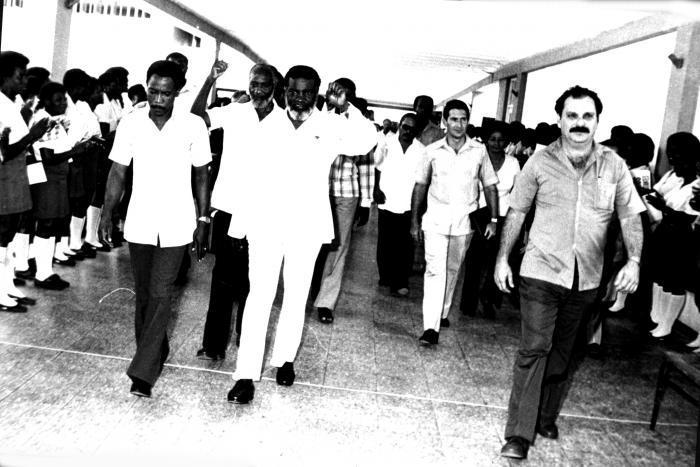
I could begin by evoking that street, there, in the ventricle of Windhoek, Namibia, with the name of Fidel, not by someone's spontaneous occurrence, but by the gratitude of an entire people.
My memory could go back to that warm embrace, from white brother to black brother, and vice versa, between the Commander-in-Chief and Sam Nujoma?
I prefer, however, to go inside the modest African leader, so that many people, especially young people, understand why today our flags fly at half-mast; why the death of such a man generates sadness; why so much love, from so far away, for Cuba.
Reasons, there are plenty of them; moments and places to enumerate, too. Cassinga, in southern Angola, is one. It is May 4, 1978. It shelters Namibian refugees fleeing from the occupation to which their homeland has been subjected. Suddenly, the South African air force. Hell takes concrete form. Horrifying massacre that does not differentiate between children, women, elderly, helpless people?
Quickly, Cuban internationalists prevent the total extermination, offer medical assistance. Perhaps none of the victims is Nujoma's filial family, but in essence they all become his sons, brothers, fathers. For this reason, he will never lose a platform to express to the world his indescribable gratitude towards Cuba.
Isle of Youth. Many survivors of the massacre will study in the school that they never dreamed of while they slept there, with one eye open and the other closed, in the middle of the jungle. But listen to this: years later, they will return to their country, already graduated, ready to take charge, to become ministers, to do good... And Nujoma there, looking at everything, with his pupil blissfully wet.
The year 1988. The South African racist beast definitely breaks its fangs against Cubans and Angolans in Cuito Cuanavale. The victory will give a total turn to the front axis of the continent, by creating bases to expel the aggressor through the southwestern flank, to apply - at last - Resolution 435 of 1978 for the independence of Namibia, and to incinerate the opprobrious regime of racial segregation, known as apartheid, within the South African territory itself.
And Sam Nujoma there, perhaps regretting not being able to express to Fidel and millions of Cubans, in exact words, the gratitude that a man and a nation can carry in the box of their chest.
I remember that in those days I coincided, near the border, with a group of Cubans and Namibians (a separate paragraph to underline the impeccable bearing and appearance of the Swapo: as we called those excellent soldiers).
Someone spoke of the stoicism with which three of them rejected South African forces bent on taking the corpse of a Cuban combatant as a war trophy. On one side, the envoys from Petroria. On the other, the "boys" from Nujoma.
So... no one doubts it: we have mutually endearing reasons to embrace, to grieve for the physical death of that leader who, like yesterday -observing, thanking-, is still there.















